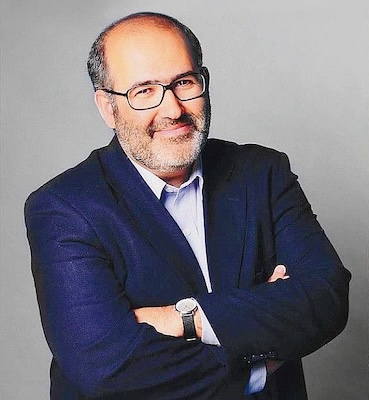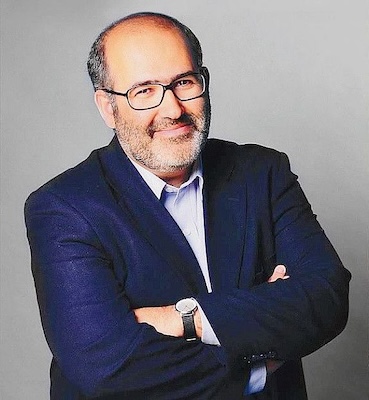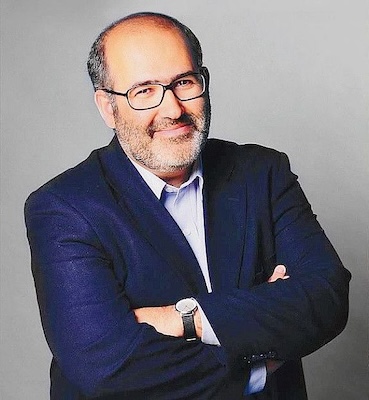Notre lettre 1199 publiée le 3 mai 2025
TOLENTINO DE MENDONCA, PAPE ?
CE N'EST SIMPLEMENT PAS POSSIBLE...
English version at the bottom of the letter
Versione italiana in fondo alla lettera

Le cardinal Parolin étant actuellement un peu à la peine, d’autres papables s’avancent, lesquels, bien entendu sont présentés comme des candidats de compromis. Tel le cardinal José Tolentino de Mendonça, ecclésiastique cultivé, urbain, que déjà en 2021, le Catholic Herald donnait pour « le genre de figure acceptable pour toutes les factions et capable d’attirer un large soutien parmi elles. »
En réalité, ce cardinal 60 ans, très bien sur soi, est le type même du faux centriste et du vrai mondain. Portugais de Madère, bibliste, tertiaire dominicain, devenu archiviste et bibliothécaire de l’Église romaine en 2018, il a été invité, toujours en 2018, à prêcher la retraite de carême de la Curie et a été créé cardinal dans la foulée. Et il a été nommé en septembre 2022 Préfet d’un grand Dicastère, celui pour la Culture et l’Éducation, où il succédait à deux figures de la gauche curiale, le cardinal Ravasi, qui était Préfet du Conseil Pontifical pour la Culture, et le cardinal Versaldi, qui était Préfet de la Congrégation pour l’Éducation catholique. Il y a été rejoint en 2023 par le P. Antonio Spadaro, sj, ancien directeur de La Civiltà Cattolica, grand stratège des forces de « progrès », comme sous-secrétaire de ce Dicastère.
José Tolentino de Mendonça est l’auteur d’une œuvre de poésie, théâtre, essais, prières, qui lui a valu une série de prix littéraires. Très en phase avec les élites gouvernantes portugaises, il a été désigné en 2019 « personnalité portugaise de l’année » par l’hebdomadaire Expresso. Il a un sens plus aigu encore que celui du pape Bergoglio pour détecter les murs à abattre (« Nous vivons au milieu de la ville, dans cet espace plein de frontières et plein de murs invisibles et de blocages existentiels », Renascença, décembre 2016), spécialement les barrières qui enferment ces exclus que sont, paraît-il, les homosexuels. Autour du jeune poète érotique José António Almeida aux « trois identités », poète, catholique et homosexuel, se réunissaient de jeunes catholiques, dans le centre de Lisbonne, à la chapelle du Rato, pour réfléchir sur leur pratique que l’Église considère encore comme un « mal moral intrinsèque ». Avec le P. José Manuel Pereira de Almeida, curé de Santa Isabel, José Tolention de Mendonça, « fabuloso le plus fabuleux de toute la fabulosité », comme on disait alors, accueillait ce groupe informel.
À Santa Isabel, ils avaient invité le Père Domenico Pezzini, orfèvre en la matière, désigné par l’archevêque de Milan de l’époque pour accorder une « attention particulière » aux homosexuels. Pezzini avait été « le moteur » d’un mouvement appelé La Fonte qui cherchait à matérialiser « l’option préférentielle » de l’Église « pour les marginalisés, pour les exclus » (préface du livre Le mani del vasaio. Un figlio omosessuale: che fare?, Paulinas, 2009, par le P. Pereira de Almeida). Don Pezzini, animateur de groupes qui étudiaient la compatibilité de l’homosexualité avec le catholicisme, a finalement été arrêté à Milan – il avait 73 ans – pour répondre d’accusations de violences sexuelles répétées sur un adolescent.
José Tolention de Mendonça est en outre très liée avec la Sœur Teresa Forcades, bénédictine de Montserrat, une féministe qui qui parcourt le globe et travaille « pour une pleine inclusion de l’homosexualité dans l’Église. » Il a donné une préface au livre de la Sœur Forcades, La teologia feminista en la història (Fragmenta Editorial, 2007), dans lequel elle insère la théologie féministe au sein de la « théologie critique » ou théologie de la libération,
En fait, José Tolentino Mendonça, qui a fait de son Dicastère un véritable think tank sur l’Église du futur, se projette avec les personnes qui l’entourent dans un post-catholicisme, où l’achèvement de la sécularisation devient une opportunité : la sécularisation d’aujourd’hui, à la différence de celle issue des Lumières, s’associe au catholicisme qui devient l’ouverture spirituelle de la postmodernité.
Tolentino de Mendonça, Pope? Simply not possible

With Cardinal Parolin currently struggling, other papal candidates are emerging as compromise candidates. One such candidate is Cardinal José Tolentino de Mendonça, a cultured, urbane cleric, whom the Catholic Herald already described in 2021 as "the kind of figure acceptable to all factions and capable of attracting a broad support among them."
In reality, this 60-year-old cardinal, very sure of himself, is the epitome of a false centrist and a true man of the world. A Portuguese native of Madeira, a biblical scholar, and a Dominican tertiary, he became archivist and librarian of the Roman Church in 2018. He was invited, also in 2018, to preach the Curia's Lenten retreat and was subsequently created a cardinal. And in September 2022, he was appointed Prefect of a major Dicastery, the Dicastery for Culture and Education, thus succeeding to two figures of the curial left: Cardinal Ravasi, who was Prefect of the Pontifical Council for Culture, and Cardinal Versaldi, who was Prefect of the Congregation for Catholic Education. He was then joined in 2023 by Fr. Antonio Spadaro, SJ as Undersecretary of this Dicastery, former director of La Civiltà Cattolica and a great strategist of the forces of "progress”.
José Tolentino de Mendonça is the author of a body of work including poetry, plays, essays, and prayers, which has earned him a series of literary awards. Very much in tune with the Portuguese governing elite, he was named "Portuguese Personality of the Year" in 2019 by the weekly magazine Expresso. He has an even keener sense than Pope Bergoglio for detecting the walls that need to be broken down ("We live in the middle of the city, in this space full of borders, full of invisible walls and existential blockages," Renascença, December 2016), especially the barriers confining the excluded ones, who are, it seems, the homosexuals. Around the young erotic poet José António Almeida, with his "three identities"—poet, Catholic, and homosexual—young Catholics gathered in the center of Lisbon, at the Chapel of Rato, to reflect on the lifestyle they practice, which the Church still considers an "intrinsic moral evil." This informal group was hosted both by Father José Manuel Pereira de Almeida, parish priest of Santa Isabel, and José Tolention de Mendonça, " fabuloso, the most fabulous of all fabulosity," as they called him at the time.
There, at Santa Isabel, they had invited Father Domenico Pezzini, an expert in the field, appointed by the Archbishop of Milan at the time to pay "special attention" to homosexuals. Pezzini had been "the driving force" of a movement called La Fonte, which sought to materialize the Church's "preferential option" "for the marginalized, for the excluded" (preface to the book Le mani del vasaio. Un omosessuale figlio: che fare?, Paulinas, 2009, by Father Pereira de Almeida). Don Pezzini, a leader of groups studying the compatibility of homosexuality with Catholicism, was eventually arrested in Milan—he was 73 years old—to face charges of repeated sexual assault against a teenager.
José Tolentino de Mendonça is also closely linked to Sister Teresa Forcades, a Benedictine nun from Montserrat, a feminist who travels the globe and works "for the full inclusion of homosexuality in the Church." He wrote a preface to Sister Forcades's book, Feminist Theology in History (Fragmenta Editorial, 2007), in which she inserts feminist theology within "critical theology" or liberation theology.
In fact, José Tolentino Mendonça, who has made his Dicastery a veritable think tank on the Church of the future, projects himself and those around him into a post-Catholicism, where the completion of secularization becomes an opportunity: today's secularization, unlike that of the Enlightenment, is associated with Catholicism, which becomes the spiritual opening of postmodernity.
Tolentino de Mendonça, papa? Semplicemente, una non possibilità

Mentre il cardinale Parolin si trova attualmente in difficoltà, si stanno facendo avanti altri candidati papali, che, ovviamente, vengono presentati come candidati di compromesso. È il caso del cardinale José Tolentino de Mendonça, un ecclesiastico colto e urbano, che il Catholic Herald aveva già descritto nel 2021 come "il tipo di figura accettabile per tutte le fazioni e capace di attirare un ampio sostegno tra di esse". »
In realtà, questo cardinale sessantenne, molto sicuro di sé, è il tipico esempio del falso centrista e del vero mondano. Portoghese di Madeira, biblista, terziario domenicano, divenuto archivista e bibliotecario di Santa Romana Chiesa nel 2018, è stato invitato, sempre nel 2018, a predicare gli esercizi spirituali quaresimali della Curia ed è stato creato cardinale in seguito. Poi, nel settembre 2022, venne nominato Prefetto di un grande Dicastero, quello della Cultura e dell'Educazione, succedendo così a due figure della sinistra curiale, il cardinale Ravasi, già Prefetto del Pontificio Consiglio della Cultura, e il cardinale Versaldi, già Prefetto della Congregazione per l'Educazione Cattolica. Nel 2023 si è unito a lui come sottosegretario di questo Dicastero, P. Antonio Spadaro, SJ, già direttore de La Civiltà Cattolica, grande stratega delle forze del "progresso".
José Tolentino de Mendonça è autore di un corpus di opere comprendendo poesie, opere teatrali, saggi e preghiere, che gli hanno fatto guadagnare numerosi premi letterari. Molto in sintonia con l'élite governativa portoghese, è stato nominato "personalità portoghese dell'anno" nel 2019 dal settimanale Expresso. Ha un fiuto ancora più acuto di Papa Bergoglio nell’individuare i muri che devono essere abbattuti (“Viviamo nel mezzo della città, in questo spazio pieno di confini e pieno di muri invisibili e blocchi esistenziali”, Renascença, dicembre 2016), in particolare le barriere che imprigionano le persone escluse, che sono, a quanto pare, gli omosessuali. Attorno al giovane poeta erotico José António Almeida, con le sue "tre identità" - poeta, cattolico e omosessuale - i giovani cattolici si sono radunati nel centro di Lisbona, nella cappella del Rato, per riflettere sulla loro pratica, che la Chiesa considera ancora un "male morale intrinseco". Insieme a padre José Manuel Pereira de Almeida, parroco di Santa Isabel, José Tolention de Mendonça, "il fabuloso’, il più favoloso di tutta la favolosità", come veniva chiamato all'epoca, accolse questo gruppo informale.
Fu proprio lì, a Santa Isabel, dove avevano invitato Padre Domenico Pezzini, esperto in questa materia, allora incaricato dall'arcivescovo di Milano di prestare "particolare attenzione" agli omosessuali. Pezzini era stato il "motore" di un movimento chiamato La Fonte, che cercava di materializzare "l'opzione preferenziale" della Chiesa "per gli emarginati, per gli esclusi" (prefazione al libro Le mani del vasaio. Un omosessuale figlio: che fare?, Paulinas, 2009, di P. Pereira de Almeida). Don Pezzini, leader di gruppi che studiavano la compatibilità dell'omosessualità con il cattolicesimo, è stato finalmente arrestato a Milano – aveva 73 anni – per rispondere dell'accusa di ripetute violenze sessuali su un'adolescente.
José Tolention de Mendonça è molto vicino anche a suor Teresa Forcades, suora benedettina di Montserrat, una femminista che gira il mondo e si impegna «per la piena inclusione dell'omosessualità nella Chiesa». » Ha scritto una prefazione al libro di suor Forcades, La teologia feminista en la història (Fragmenta Editorial, 2007), in cui l’autrice cerca di inserire la teologia femminista all'interno della “teologia critica” o teologia della liberazione.
Infatti, José Tolentino Mendonça, che ha fatto del suo Dicastero un vero e proprio think tank sulla Chiesa del futuro, proietta sé stesso e chi lo circonda in un post-cattolicesimo, dove il compimento della secolarizzazione diventa un'opportunità: la secolarizzazione odierna, a differenza di quella emersa dall'Illuminismo, si associa al cattolicesimo, che diventa l'apertura spirituale della postmodernità.




